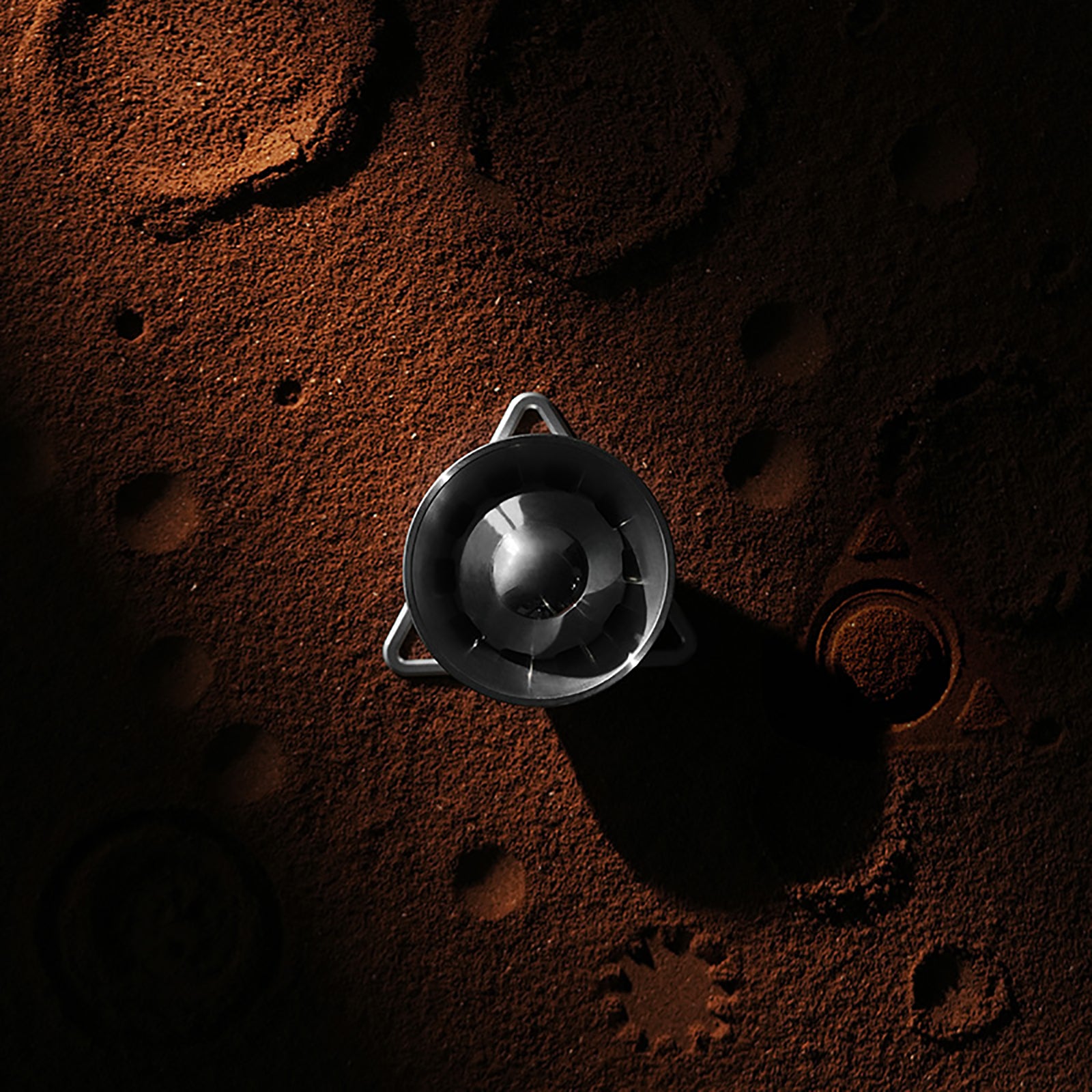Jef - Oct 09 2024
How to Clean a Coffee Grinder?
A Step-by-Step Guide

Coffee grinders are convenient and efficient, but cleaning them can often be a challenge. Properly maintaining your grinder, particularly the grinding core, is essential to ensure optimal performance and preserve the quality of your coffee. Knowing how to clean different types of grinders correctly, such as blade or burr grinders, and understanding important cleaning tips—like avoiding moisture and using appropriate cleaning tools—are crucial skills for any coffee enthusiast. Regular and thorough cleaning helps prevent residue buildup, ensures consistent grinding, and prolongs the life of the grinder.
What is a coffee grinder?
A coffee grinder is a device that grinds coffee beans into smaller, more uniform particles for brewing. This is important because how small or large the particles are directly affects the extraction of flavors from the coffee as it brews. Different types of brewing methods require different grind sizes from very coarse to very fine, and the grinder does just that, giving the right consistencies for each method.
There are mainly two types of coffee grinders:
Blade Grinders: As the name suggests, these grinders chop beans using spinning blades. They are relatively cheap and simple to operate. Yet, they tend to create an inconsistent grind size— hence, the flavor of your coffee is compromised.
Burr Grinders: Burr grinders crush the coffee beans between two grinding surfaces (burrs) to achieve a uniform grind size. This grinder would be favored by all those who love their coffee and, funnily enough, all professionals because it is consistent and enables precise control of the grind size.
Why should you clean a coffee grinder?
By prioritizing regular cleaning, you can enhance your coffee experience and ensure your grinder remains in optimal condition.
Preserves Flavor: The oils and residues of coffee can accumulate with time in the appliance and later make your coffee taste stale. With regular cleaning, every cup will give you a fresh and lively taste.
Maintains Consistency: The grinder, when clean, guarantees uniformity in ground size–a very important reason for optimum extraction. Any inconsistency in grind sizes can lead to over-extraction or under-extraction, and overall, it affects the taste.
Prevents Contamination: Used coffee grounds and old oils are some of the bacterial and mold growth media that might make their way into your fresh pot of coffee. Cleaning ensures that you maintain hygiene and safety with your brewing processes.
Extends Lifespan: If looked at every now and then, it avoids pressure on the components through wear and tear, offering a longer lifespan to the appliance to work perfectly.
Improves Performance: A cleaner grinder works better, ensuring better extraction during brewing; the grinding process itself becomes much swifter.
How often to clean a coffee grinder?
If you use your coffee grinder every day, a quick cleaning each week is recommended. Regularly removing oils from the beans is crucial; if these oils are not cleaned out, they can become rancid, resulting in unpleasant odors and flavors in your coffee. For those who use their grinder less frequently, it's still essential to clean it before storing it.
This ensures that any residual oils are eliminated, keeping the grinder fresh and ready for use when you need it. By adhering to these cleaning practices, you can maintain the quality and taste of your coffee over time.
What you'll need?




How to clean a blade coffee grinder?
Cleaning a blade coffee grinder is essential for maintaining its performance and ensuring the best flavor in your coffee. Here’s a step-by-step guide to clean your blade grinder:
Add Grinder Cleaning Tablets: Pour dry rice or cleaning tablets into the hopper of the blade grinder. Alternatively, you can use grinder cleaning tablets made from natural grains, which are available at coffee shops or online.
Run the Grinder: Turn on the grinder and run it for about a minute, until the rice or tablets are reduced to a fine powder. This process helps absorb oils and removes excess coffee grounds.
Power Down the Grinder: Once the rice or tablets are pulverized, turn off the grinder and unplug it from the wall outlet.
Empty the Grinder Hopper: Dump the pulverized rice or cleaning tablets into a trash can. Tap the sides of the grinder to dislodge any remaining powder stuck in the hopper.
Wipe Clean: Dampen a microfiber coffee towel and wipe down the interior of the hopper, paying special attention to the blades. Also, wipe the exterior of the grinder to remove any fingerprints or grime.
How to clean a burr coffee grinder?
Cleaning a burr coffee grinder is essential for maintaining its performance and ensuring the best flavor in your coffee. While the process can be more labor-intensive than cleaning a blade grinder, following these steps can simplify the task:
Remove Every Piece: Remove all plastic and rubber removable parts, including the grinding chamber if it is allowed in the owner’s manual of your grinder. Wash these pieces with hot soapy water and a non-abrasive sponge, rinse well, and dry with a microfiber towel.
Remove the Inner Burr: Gently take out the inner burr. In some grinders, you might require the help of a screwdriver to do this.
Scrub with a Brush: Scrub with a brush stiff, such as a toothbrush, to remove any coffee grounds that might be stuck within the burrs' various nooks and crannies. For the tiny crevices, a toothpick may come in handy in pushing out some of the more adamant grounds.
Wipe Down the Burrs: Utilize a microfiber cloth to dry the burrs and soak up the oils that were drawn out. Do not apply any washing liquid to the burrs; it will be a set-up for their rusting.
Clean the Coffee Chute: Be sure to clean the chute where coffee beans drop from the hopper into the grinder. A cotton swab is effective for this.
Let It Dry: Allow all components to air dry completely before reassembling the grinder. This step is crucial to prevent rust and ensure optimal performance.
Reassemble the Grinder: Once everything is clean and dry, carefully reassemble the burr grinder. Your grinder is now ready for use, ensuring you get the best flavor in every cup of coffee.
Here is a video about disassembling, cleaning, and assembling a burr coffee grinder:
Tips for Cleaning Coffee Grinders
When cleaning your coffee grinder, consider the following essential tips:
- Beware of Rice and Vinegar: While rice may be helpful for other cleaning tasks, it is not suitable for burr coffee grinders. The density and hardness of coffee beans are designed for the grinder, unlike rice, which can cause damage. Additionally, using rice or vinegar to clean your grinder may void your warranty, leading to more significant issues than stale coffee.
- Clean Frequently: For blade grinders, clean weekly if used daily. For burr grinders, a monthly cleaning is sufficient. Wiping down the grinder with a cloth after each use can make deep cleaning much easier.
- Use Cleaning Tablets: Instead of disassembling your burr grinder, consider using specialized cleaning tablets. These can effectively clean the grinder without the need for extensive disassembly.
- Avoid Water: While you can wipe down the grinder with a damp cloth, never place it under running water, as this can lead to rust. Use a dry microfiber cloth to remove any residual coffee particles and oils.





